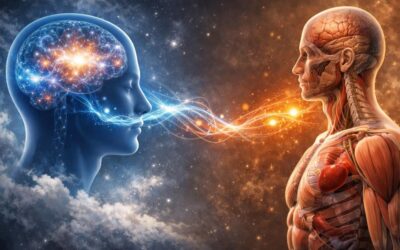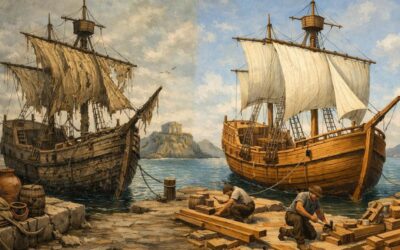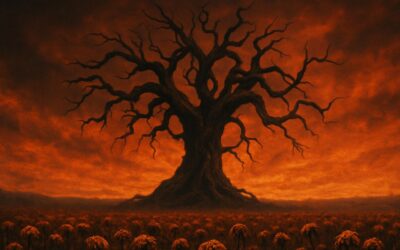Spark Discussion
Are you the same person you were five years ago? Go ahead, take a moment. The immediate answer that pops into your head is probably, “Uh, yeah, of course I am.” You have the same name, the same fingerprints, you remember being that person. It seems like the most obvious question in the world. But what if I told you it’s one of the deepest, most persistent, and most wonderfully maddening puzzles in all of philosophy? Because when you start to poke at that simple “yes,” the whole thing starts to unravel in the most fascinating way. You’ve changed, haven’t you? Your tastes, your beliefs, your goals, maybe even your entire worldview are different. And physically, you are almost entirely new. Most of the atoms that made up your body five years ago are long gone, replaced by atoms from the food you’ve eaten and the air you’ve breathed. So if your mind has changed and your body is made of different stuff, in what sense are you still you? This is the core question of the Self and Identity, a philosophical rabbit hole so deep it makes you question the very foundation of your existence.
To get a handle on this, let’s take a trip back to ancient Greece and talk about a famous ship. The philosopher Plutarch tells the story of the Ship of Theseus, the vessel that the great hero Theseus sailed back to Athens after slaying the Minotaur. The Athenians, to preserve this legendary ship as a memorial, took meticulous care of it. Whenever one of the old wooden planks began to rot, they would replace it with a new, identical one. Over the years, this continued until, eventually, not a single one of the original planks remained. This leads to the big question: is this still the Ship of Theseus? It’s in the same spot, it looks the same, everyone calls it the same thing. But it’s made of entirely new material. Now, to make it even trickier, what if some clever collector had gathered up all the old, discarded planks and reassembled them in his backyard? Which one is the real Ship of Theseus? The one at the harbor, or the one made of the original parts?
This isn’t just a puzzle about boats; it’s a puzzle about you. You are the Ship of Theseus. Your body is constantly replacing its parts. So if you believe your identity is tied to your physical body, you have a problem. How can you be the same person when you’re made of completely different matter? This usually leads people to the next logical step: okay, maybe it’s not the body. Maybe the “you” isn’t the physical stuff, but something inside it. Maybe it’s your mind, your consciousness, your memories.
This idea was famously championed by the philosopher John Locke. He argued that what makes you the same person over time is the continuous thread of memory. You are you because you remember being you yesterday, and the day before, and the year before that. Your personal identity is built on this chain of consciousness, linking your past self to your present self. This feels much more satisfying, doesn’t it? It explains our powerful, intuitive sense of being a continuous self. It’s the software, not the hardware, that matters. But, like any good philosophical theory, you can start poking holes in this one, too.
What about amnesia? If a person suffers a tragic accident and loses all their memories, are they no longer the same person? To their family, they look the same, but to themselves, they are a stranger. Are they a new person in an old body? And what about all the things you forget? I have no idea what I ate for lunch on this day three years ago. Does that mean I am not the person who ate that lunch? Our memories are faulty, gappy, and often completely wrong. Can we really build the entire foundation of our identity on something so unreliable? And what happens when you go to sleep? Your consciousness is switched off for hours every night. What guarantees that the person who wakes up in your bed is the same one who went to sleep? It seems our powerful chain of consciousness has some pretty weak links.
This is where some modern thinkers propose a different, and I think beautiful, idea: the Narrative Theory of self. Maybe the self isn’t a thing at all—not a physical body, and not a continuous stream of consciousness. Maybe the self is a story. From the moment we’re born, we begin to gather experiences, and our brain, the ultimate storyteller, starts weaving them into a coherent narrative. “I” am the main character in this ongoing autobiography. This story has a past, a present, and a hoped-for future. It has defining moments, character development, and recurring themes.
This view handles the previous problems with a certain elegance. The Ship of Theseus is the same ship because its story, its history, its role as a monument, continues. You are the same person you were five years ago, not because you’re made of the same atoms or because you remember every single moment, but because you have incorporated that five-years-ago version of yourself into the grand narrative of your life. He or she is a character in a previous chapter of the book of “You.” This theory allows for change, growth, and even radical transformation, which feels much more true to the human experience than the idea of a fixed, unchanging self. Your identity isn’t a static object; it’s a dynamic, evolving story that you are both reading and writing at the same time.
But if you really want to blow your own mind, there’s one more stop on our philosophical journey: the idea of “no-self.” The Scottish philosopher David Hume famously argued that if you try to look inward to find this “self,” you’ll never find it. Go ahead, try it. Look inside your own mind. What do you find? You’ll find a thought, then a feeling of itchiness, then a memory of breakfast, then a sensation of the chair you’re sitting on, then a worry about tomorrow. It’s just a constant parade, a bundle of different perceptions, one after another. But, Hume argued, you will never find the single, stable “thing” that is having these experiences. The self, he concluded, is just a fiction we create to make sense of this bundle of sensations. Similarly, in Buddhist philosophy, the concept of Anattā teaches that the idea of a permanent, separate self is an illusion, and clinging to this illusion is the root cause of our suffering.
This is a radical thought. What if the “you” you spend so much time worrying about, defending, and trying to improve… doesn’t actually exist? What if you are not a noun, but a verb? Not a thing, but a process? It’s a dizzying idea, but it can also be incredibly liberating. If there’s no fixed self to protect, maybe we can let go of our anxieties a little. Maybe we can be more fluid, more present, and more connected to the ever-changing flow of experience that is life itself.
So, where does that leave us? We’ve explored the idea that you are your body, your memories, your story, or maybe nothing at all. There is no simple, one-size-fits-all answer, and any philosopher who tells you they’ve solved it is probably trying to sell you something. But maybe the point of asking “What makes you, you?” isn’t to find a definitive answer. Maybe the point is the journey the question inspires. By wrestling with these ideas, we learn to see ourselves and others in a more nuanced, compassionate, and expansive way. We realize that identity is not a simple fact, but a profound mystery we get to live inside of every single day.
After all this, which idea resonates most with you? Do you see yourself as a physical being, a stream of consciousness, a living story, or something else entirely? Share your perspective in the comments below.










0 Comments